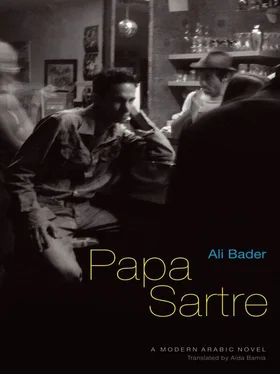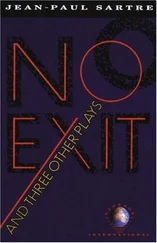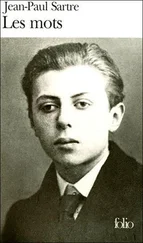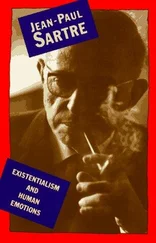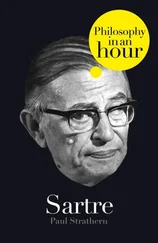This Cartesian Frenchwoman was faced with a choice between two totally different lives but could select only one. The first option was biological: love or the mere perpetuation of the human race. The second was social and would bring wealth. She chose the latter. She realized the wisdom of her choice when Abd al-Rahman visited her apartment and brought her a huge bouquet. He then asked her timidly, “Do you like escarole?” to which she replied with her head bent in affected embarrassment, “Yes.” At this moment Abd al-Rahman took a bag from the pocket of his black coat, placed it on the table, and poured two glasses of champagne. He adjusted the white rose in his buttonhole, moved to the far end of the room, and took out candles and dishes from the drawer where Germaine kept them neatly wrapped in a piece of cloth. He placed them in front of her and asked, “Germaine, will you marry me?” to which she replied, “I’ll think about it.”
Germaine didn’t have a negative view of Baghdad. She didn’t find it particularly ugly nor did she suffer from its burning heat or its people who were so different from the French. Abd al-Rahman provided her with a large, luxurious house in Mahallet al-Sadriya, surrounded by trees and a brick wall. His father was the first to bless the house where he expected his grandchildren to be born, those who would perpetuate his name and memory. Abd al-Rahman’s father was convinced of his son’s genius and respected him for his mind, but also because he had married a Frenchwoman. He considered his son’s marriage to a Frenchwoman a distinction that could not be matched. For him it signified that fashionable, brilliant Europe appreciated and respected his son by marrying off one of its daughters to him. He saw it as a family alliance between him and de Gaulle, rather than the mere fact that a young man had met a woman in Paris while studying there and brought her home. His father therefore busied himself furnishing the house to suit the tastes of his son’s French wife. He was determined to provide her with everything and did not want to appear stingy. She, on the other hand, was annoyed by his excessive generosity and his continuous intrusions into their lives, yet she accepted his help and showed appreciation and respect for his feelings.
Germaine liked this strange, oriental-looking Mahalleh district with its narrow winding streets. In the souk she felt like a tourist in the city she had read about, the Baghdad of the One Thousand and One Nights . She imagined herself a Christian prisoner locked in her quarters by an oriental prince. She had to compartmentalize her thinking: one mode of thinking was incredibly sarcastic; the other allowed her to pretend to experience nausea, in order to please her husband. She was able to hide her sarcasm during the first year of their marriage, and so the time passed without major incident. She pleased her husband’s existential tastes in various ways. This lasted until she gave birth in Paris to twins, a girl and a boy. When she called her husband and anxiously asked him what he wanted to call the children, he told her, “call the boy Abath (Absurdity) and the girl Suda (Nothingness).” When he translated the meaning of the names, she slammed the receiver and broke down crying. She felt the loneliness she had known before and realized that the mind she had split in two had rejoined itself.
She was vexed and disgusted, even angry, but she controlled herself because she was well aware that her husband was serious and inflexible. She realized that an existentialist is truly obsessed, and even sick, with no hope of a cure. Her punishment for him was to put an end to her affected nausea when she returned to Baghdad. She neither cared for his philosophy nor for him. She lived her life with total disregard for existentialism. She was totally cured and concentrated her efforts on raising her children to prevent them from becoming like their father, making sure that they did not become fanatical believers in anything. In order to take proper care of her children she needed to take care of herself and her health. She took extreme care of her skin, her hair, and her figure, remaining slim and agile, exercising every day, eating at regular hours, and taking hot baths. She was obsessed with the European fear of aging, of death, and anything reminding her of death, sickness, or the gradual disintegration of the body.
There was no room for the philosopher in his own house. There was no nausea or any other external manifestation of existentialism. Germaine left everything behind in Paris. For Abd al-Rahman, love with a woman devoid of philosophy was meaningless. So he was compelled to search for his nausea elsewhere, which naturally led him to Sherif and Haddad’s bar on al-Rashid Street and the Café Brazil. But at night, his nausea only manifested itself at the Grief Adab nightclub and with its owner, the dancer Dalal Masabni.
4
Dalal was a Christian dancer who had received her training in Beirut from one of al-Hamra Street’s most famous dancers. Although she experienced nausea, especially when she was in the company of the philosopher, she also suffered from a malaise, a sickness of the century. The philosopher told her that she had a Chateaubriand air, but the truth is that she was young and seductive. Frankly, although Dalal was intensly attracted to Hadoub’s virility, she was just as attracted to the philosopher’s open pocket.
Dalal felt compelled to accommodate her customers by sharing their feelings, so each time she slept with the philosopher she confessed to a strong feeling of nausea. This attracted the philosopher to her, especially because his wife’s feeling of nausea had disappeared since she had returned from Paris. He explained his wife’s condition by saying that Baghdad lacked the existential atmosphere that in Paris fostered such pure philosophical sensations.
When Abd al-Rahman asked his wife to explain why she experienced such an intense nausea in Paris but none at all in Baghdad, she smiled and said, “Simply put, I had not lost my strong existential feeling then.” This compelled the philosopher to look for someone else because he couldn’t bear the idea of an individually experienced nausea. He used to compare the nausea to a kiss that has to be shared by a man and a woman. Germaine and he had stopped having sex, especially after the birth of the twins, Abath and Suda. When one day he insisted on his rights she shouted in his face, “I am raising your Abath and Suda, so deal with your nausea alone. This is a fair division of labor. You did not worry about Abath, who caught German measles, or Suda, who didn’t stop crying for two days. I spent a whole day in Dr. Simon Bahlawan’s clinic. So take your nausea elsewhere and leave me in peace.”
He did not appreciate her critical arguments at all, which shed doubt on all aspects of existentialism, against his philosophy. He swallowed her attacks calmly and put down Les chemins de la liberté . He rearranged the black-framed eyeglasses that resembled Sartre’s, got dressed, and left in a hurry. He walked down King Ghazi Street just as the street sweeper was pushing the garbage in front of him. He quickened his step to avoid the debris but didn’t make it. Instead, he ended up inhaling the dust and fell victim to an allergy attack. He headed toward the entertainment district, where movie houses advertised films with posters and neon lights. The sight of a yellowing leaf on a branch, a feather on a shop awning, or a fruit peel crushed by pedestrians, left him nauseated. He longed for the change of seasons and for a nausea that combined all his pleasures into a single experience, derived from all his senses. He hoped for an emotion that would enliven and tickle his mind.
Abd al-Rahman found great pleasure in his own nausea, but not Sartre’s, as an expression of his complex and muddled feelings. This nausea allowed him his first opportunity to convey what was going on in his little head. Through it he was able to choose, think, and be content, after having spent his childhood and adolescence oppressed, repressed, and unable to express his thoughts freely. Nausea was a new channel through which he could associate sight and smell, two senses that mingled to form one indescribable impression. It flavored an idea, and allowed it to be presented in a uniquely charming way, deep and mysterious. This is the feeling that Abd al-Rahman adopted in his philosophy and named nausea.
Читать дальше
